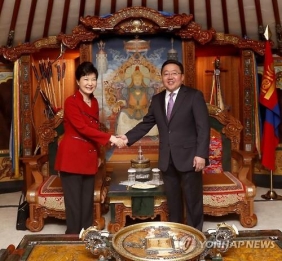ID :
412308
Mon, 07/18/2016 - 13:10
Auther :
Shortlink :
https://oananews.org//node/412308
The shortlink copeid
Yonhap: Park's Mongolia trip boosts her drive against N. Korean nukes

Ulaanbaatar /MONTSAME/ President Park Geun-hye's five-day visit to Mongolia has added fresh momentum to her efforts to cement international cooperation in dealing with North Korea's nuclear ambitions and forestall trade protectionism, observers said Monday.
Park also capitalized on her first presidential trip here to renew global attention to the North's human rights violations and promote her policy drive to lay the groundwork for reunification, which she said would offer a "fundamental solution" to various North Korea problems.
But her brisk summit diplomacy was partly overshadowed by a terrorist attack in France, a botched military coup in Turkey and violent protests in a town in southern South Korea against the plan by Seoul and Washington to deploy an advanced U.S. anti-missile system.
Park's official schedule in Mongolia began Friday with her attendance at the Asia-Europe Meeting (ASEM) summit, which was held until Saturday under the main theme of "20 years of ASEM: Partnership for the Future through Connectivity."
During the first round of the summit, Park focused on warning against the recrudescence of protectionist and isolationist tendencies.
After Britain's shocking vote last month to exit the European Union (EU), Park has repeatedly stressed the importance of fostering open, free trade across the world, underscoring the fact that South Korea's export-reliant economy has benefited much from free trade.
"Uncertainties in the environment of the global economy are increasing. But we should not forget the historical lesson that the growth of the world economy has come in tandem with the spread of free trade," Park said as a lead speaker at the first session of the ASEM summit.
Park's free trade mantra did not end only with verbal statements.
During her talks with European Commission President Jean-Claude Juncker and European Council President Donald Tusk on Friday, the two sides shared the need to revise the bilateral FTA, which was signed in 2010 and provisionally took effect in 2011.
The two sides concurred that a revision of the South Korea-EU FTA is needed to "in consideration of the situational changes" over the last five years -- in an allusion to Britain's decision to quit the EU.
In addition, Park reached an agreement Sunday with her Mongolian counterpart Tsakhiagiin Elbegdorj to seek an "economic partnership agreement (EPA)," similar to a free trade pact. The two sides will launch joint research on the EPA as early as late this year.
To further strengthen multilateral cooperation in curbing trade protectionism and promoting open trade, Park proposed resuming the ASEM economic ministers' meeting in South Korea next year. The talks have not been held since 2003.
During her stay in Mongolia, Park also revved up her diplomacy to further catalyze an international campaign to cajole Pyongyang into renouncing its nuclear and missile programs through sanctions and other forms of pressure.
The president called on the ASEM leaders to join forces to pressure the communist regime to abandon its nuclear ambitions, highlighting that the North remains the biggest "stumbling block" to the ASEM's vision for a free, peaceful and interconnected Eurasia.
Park, in particular, stressed that the unification of the Korean Peninsula would be a fundamental solution to a series of "North Korea problems," including its rights abuses and persistent military threats.
Her efforts culminated in the ASEM leaders' adoption of the chair's statement that condemned Pyongyang's nuclear and missile programs in the "strongest terms," and called for "vigilance" against any activities supporting the country's various weapons programs.
Such a chair's statement came after the South Korean chief executive made an emphatic appeal for the North's denuclearization during her official and unofficial meetings with top officials of the EU, Laos, Vietnam, Cambodia, the Czech Republic, Bulgaria and other countries.
"(Park) helped spread (international) support for Seoul's policy to tackle North Korea problems and (prepare for) the reunification of the Korean Peninsula," Kim Kyou-hyun, the senior presidential secretary for foreign affairs, told reporters.
"This has helped deepen and widen our diplomacy with Asia and Europe," he added.
Cashing in on her second summit this year with the Mongolian leader, Park also sought to expand economic ties with the resource-rich country.
The two sides reached an understanding to seek South Korea's participation in 14 large scale projects being pursued by Mongolia, including some urban development schemes and infrastructure programs to build power plants and railways. The project moreover calls for expanding the country's electricity transmission networks.
The projects are estimated to be worth $4.49 billion in total. To support South Korea's participation in these projects, the two sides signed 20 memorandums of understanding, mostly over bilateral economic cooperation. (Yonhap)





